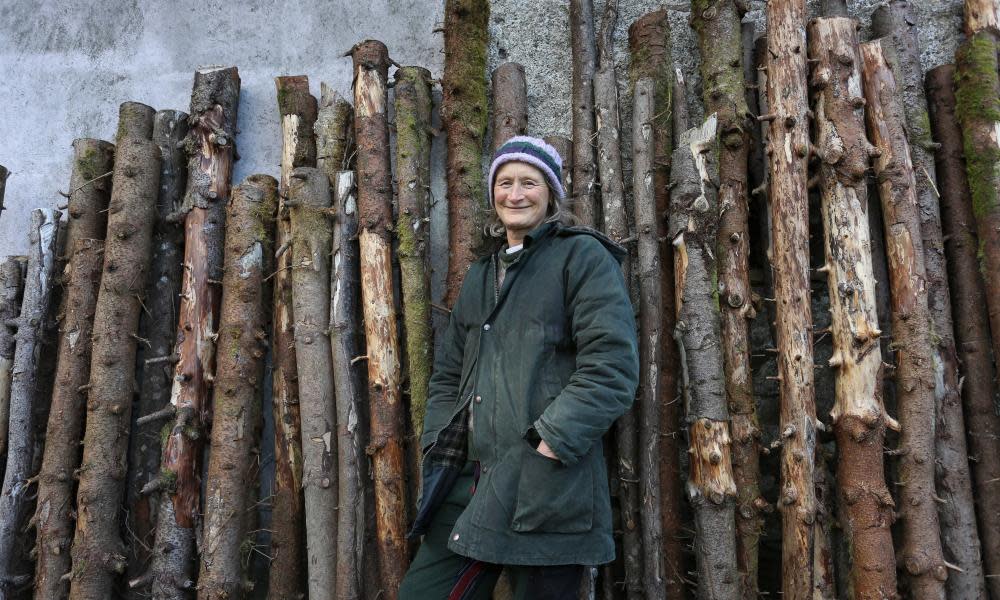Welsh woman declares vindication after ‘guerrilla rewilding’ court case

Sioned Jones used to adore the landscape and wildlife of her adopted home in Bantry, a bucolic region in west Cork on Ireland’s Atlantic coast. She planted vegetables and herbs, foraged for nuts and berries and observed birds, insects, frogs and lizards.
Then, on land above her house, the state-owned forestry company Coillte planted a forest of Sitka spruce, a non-native species that Jones considered a dark, dank threat to biodiversity.
The Welsh grandmother got a chainsaw and started cutting – and cutting. A few trees at first, then dozens, then hundreds. In their place she planted native broadleaf trees – birch, hazel, oak, alder, crab apple and rowan – a guerrilla rewilding campaign that lasted more than 20 years.
The law caught up with 61-year-old Jones on Friday, when a Cork circuit criminal court convicted her of stealing logs worth €500. Sentencing was adjourned until October.
The judge, Seán Ó Donnabháin, directed the jury to find Jones not guilty of the more serious charge of criminal damage to 500 Sitka spruce trees.
Jones declared vindication. “Citizens have a duty to protect the environment and biodiversity,” she told the Guardian. “I was managing that site for biodiversity. It was being destroyed by the spruce.”
She started felling soon after the plantation appeared in 1995, targeting trees that cast bilberry plants in shadow, she said. “Nobody said anything so I continued. As time went on, I got bolder.”
Initially she used manual saws, later switching to mechanical saws. “I’m a strong woman. I ended up using a chainsaw, yes. That’s how they caught me.” Jones hopes the case will become a catalyst to change forest policy.
Her prosecution shined a light on a national afforestation programme heavily reliant on Sitka spruce, a fast-growing coniferous evergreen originally from North America. The trees number an estimated 34.5m, covering what used to be farmland and wilderness. They absorb carbon and supply wood for pulp, pallets and furniture.
Critics question the carbon sequestration impact and say the plantations are industrial monocultures that stifle biodiversity and ruin the landscape.
Activists in other parts of Ireland, notably Leitrim, have campaigned against plantations but few have gone as far as Jones.
Extinction Rebellion hailed her a hero. “This makes her part of a wider campaign of conscientious protectors who take non-violent direct action to protect nature when they see it as being threatened,” the climate action group said in a statement.
This is Sioned Jones. This Bantry resident is up in court for causing damage to a sitka spruce plantation near her house. Over the last 14 years, she has quietly replaced the conifers with native broad leaf trees. pic.twitter.com/jbhhFFnols
— Extinction Rebellion West Cork (@xr_westcork) January 31, 2020
Jones, who has a biochemistry degree and a background in farming and forestry, moved to Maughanaclea in Kealkill, Bantry, in 1987.
When the Sitka spruce plantation appeared, she feared damage to biodiversity and the water supply to her well. “I was outraged. I felt obliged to act. Plants are destroyed, insects have nothing to live on, the habitat is gone.”
Jones cut down 250 trees and ringmarked – an incision around bark that slowly kills a tree – another 250. She turned some felled spruces into protective barriers for their broadleaf replacements, she said. Other logs she brought home as firewood.
A Coillte official reported unauthorised clearances on 4 December 2018. A few hours later, police intercepted Jones in her green Toyota Starlet. She was covered in sawdust and had a chainsaw. She admitted the felling.
“The felling of trees without a licence or removal of timber without proper authorisation is an illegal activity, and we work with the relevant authorities to seek prosecutions if this occurs on our lands,” Coillte said in a statement on Friday.
The company said it sets aside 90,000 hectares of land for native broadleaf trees. “We continue to invest heavily into the restoration and management of these key biodiversity habitats.”
Mr Justice Ó Donnabhái queried Jones’s claim to be an ecological guardian. “I don’t understand how a hero of the greenery can go around with a chainsaw in one hand and a burning log in the other and claim to be a protector of the environment.”
He deferred sentencing to October on condition that Jones did not target more Sitkas without Coillte’s approval. She agreed.


